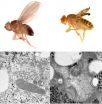(Press-News.org) WEST LAFAYETTE, Ind. - Researchers have learned the structure that results when an antibody binds to the West Nile virus, neutralizing the virus by locking up its infection mechanism. The information could help scientists develop a vaccine against the mosquito-borne disease.
The findings show precisely how a key part of the antibody, called the antigen binding fragment, or Fab, attaches to two adjacent protein molecules that make up the virus's outer shell. This "crosslinking" attachment between molecules is repeated over the entire shell, interlocking the 30 molecular "rafts" that make up the shell and preventing structural changes needed for the virus to infect host cells, said Michael Rossmann, the Hanley Distinguished Professor of Biological Sciences in Purdue's College of Science.
"The antibody crosslinking causes the virus to become rigid, and this rigidity prevents conformational changes to the virus needed to fuse with host cells," Rossmann said.
Findings are detailed in a research paper that appeared in October in Proceedings of the National Academy of Sciences. The team included postdoctoral researcher Bèrbel Kaufmann, other researchers at Purdue, the Washington University School of Medicine in St. Louis and the biotechnology company Crucell Holland B.V. in The Netherlands.
Learning how antibodies neutralize viruses is important for developing effective vaccines, Rossmann said.
"There are many antibodies that can neutralize West Nile virus," he said. "These findings concern a specific antibody, called CR4354. It uses an unusual approach to neutralize the virus. Normally an antibody binds to a single molecule, but now we see this crosslinking, which is quite clever because it ties everything rigidly together."
The researchers used a process called cryoelectron microscopy to take detailed pictures of the Fab-virus complex. They also used X-ray crystallography to learn the antibody's precise crystalline structure.
West Nile belongs to a family of viruses known as flaviviruses, which includes a number of dangerous insect-borne disease-causing viruses. West Nile virus causes a potentially fatal illness and has infected thousands of people in the United States over the past five years, killing more than 400 people in that time frame, according to the Centers for Disease Control and Prevention. The virus is endemic in parts of Africa, Asia and Europe and in the past decade has spread throughout North America and into Central and South America.
INFORMATION:
The research is funded by the National Institutes of Health.
The paper was written by Kaufmann; doctoral student Matthew R. Vogt at the Washington University School of Medicine; Jaap Goudsmit, chief scientific officer at Crucell Holland; electron microscopist Heather A. Holdaway; Purdue postdoctoral researcher Anastasia A. Aksyuka; Paul R. Chipman, director of Purdue's structural biology electron microscopy facility; Richard Kuhn, professor and head of Purdue's Department of Biological Sciences; Michael S. Diamond, professor in the departments of Medicine, Molecular Microbiology, Pathology and Immunology at Washington University School of Medicine; and Rossmann.
Writer: Emil Venere, 765-494-4709, venere@purdue.edu
Sources: Michael Rossmann, 765-494-4911, mgr@indiana.bio.purdue.edu
Bèrbel Kaufmann, bkaufman@bilbo.bio.purdue.edu
Related website:
Michael Rossmann: http://www.bio.purdue.edu/people/faculty/index.php?refID=81
Abstract on the research in this release is available at: http://www.purdue.edu/newsroom/research/2010/101102RossmannWestNile.html
Antibody locks up West Nile's infection mechanism
2010-11-03
ELSE PRESS RELEASES FROM THIS DATE:
Daily dose of beet juice promotes brain health in older adults
2010-11-03
Winston-Salem, N.C. – Researchers for the first time have shown that drinking beet juice can increase blood flow to the brain in older adults – a finding that could hold great potential for combating the progression of dementia.
The research findings are available online in Nitric Oxide: Biology and Chemistry, the peer-reviewed journal of the Nitric Oxide Society and will be available in print soon. (Read the abstract.)
"There have been several very high-profile studies showing that drinking beet juice can lower blood pressure, but we wanted to show that drinking beet ...
Severely injured should go directly to trauma center: Research
2010-11-03
TORONTO, Ont., Nov. 2, 2010-Severely injured patients should be transported directly from the scene of an accident to a trauma center, even if it means bypassing a closer hospital, according to new research that shows this results in a nearly 25 per cent lower death rate.
However, even though 80 to 85 per cent of people in North America live within a one-hour drive or flight of a trauma center, 30 to 60 per cent of severely injured patients are still taken to the nearest hospital.
Researchers led by Dr. Avery Nathens, trauma director at St. Michael's Hospital in Toronto, ...
Scientists at IRB Barcelona discover a new protein critical for mitochondria
2010-11-03
A study by the team headed by Lluís Ribas de Pouplana, ICREA professor at the Institute for Research in Biomedicine (IRB Barcelona), has been chosen as "Paper of the week" in the December issue of the Journal of Biological Chemistry, which is already available online. The article describes the discovery of a new protein in the fly Drosophila melanogaster (fruit fly) that is crucial for mitochondria. The removal of SLIMP in these flies leads to aberrant mitochondria and loss of metabolic capacity, thus causing death.
The study, whose first author is Tanit Guitart, a PhD ...
Brain's ability to selectively focus/pay attention diminishes with age
2010-11-03
A University of Toronto study shows that visual attention -- the brain's ability to selectively filter unattended or unwanted information from reaching awareness -- diminishes with age, leaving older adults less capable of filtering out distracting or irrelevant information.
Further, this age-related "leaky" attentional filter fundamentally impacts the way visual information is encoded into memory. Older adults with impaired visual attention have better memory for "irrelevant" information. The research, conducted by members of U of T's Department of Psychology, will ...
Shift work linked to higher risk of work injury: UBC study
2010-11-03
Canadians who work night and rotating shifts are almost twice as likely to be injured on the job than those working regular day shifts, according to a study by researchers at the University of British Columbia.
The study, published in the current issue of the Scandinavian Journal of Work, Environment and Health, examined data on more than 30,000 Canadians collected as part of Statistics Canada's Survey of Labour and Income Dynamics and compared results between workers involved in different types of shift work from 1996-2006. It shows that while the overall rate of work ...
Every person emits 2 tons of CO2 a year through eating
2010-11-03
Every person emits the equivalent of approximately two tonnes of carbon dioxide a year from the time food is produced to when the human body excretes it, representing more than 20% of total yearly emissions. That is what a study by the Universidad de Almería says, confirming for the first time that human excrements contribute to water pollution, primarily with nitrogen and phosphorus.
A team of researchers from the Universidad de Almería (UAL) has estimated the environmental impact of the Spanish diet and role that human excrements play in the life cycle of food. It is ...
Algae for biofuels: Moving from promise to reality, but how fast?
2010-11-03
A new report from the Energy Biosciences Institute (EBI) in Berkeley projects that development of cost-competitive algae biofuel production will require much more long-term research, development and demonstration. In the meantime, several non-fuel applications of algae could serve to advance the nascent industry.
"Even with relatively favorable and forward-looking process assumptions (from cultivation to harvesting to processing), algae oil production with microalgae cultures will be expensive and, at least in the near-to-mid-term, will require additional income streams ...
Exposure of humans to cosmetic UV filters is widespread
2010-11-03
Amsterdam, 2 November, 2010 - An investigation conducted in the context of the Swiss National Research Programme (NRP50), Endocrine Disrupters: Relevance to Humans, Animals and Ecosystems, demonstrates for the first time that internal exposure of humans to cosmetic UV filters is widespread.
In the course of the Summer and Fall 2004, 2005 and 2006 (3 cohorts), human milk was sampled by mothers who had given birth at the University Women's Hospital in Basel. The participants filled out a detailed questionnaire with general questions and, as special feature, in depth questions ...
New long-range undersea robot goes the distance
2010-11-03
Over the past decade, the undersea robots known as autonomous underwater vehicles (AUVs) have become increasingly important in oceanographic research. Today's AUVs fall into two groups: 1) propeller-driven vehicles that can travel fast and carry lots of instruments, but are limited to expeditions of only a few days; and 2) "gliders," which can stay at sea for weeks or even months at a time, but cannot travel very quickly. MBARI engineers recently demonstrated a new super-efficient AUV that combines the best of these two approaches. This new long-range AUV (LRAUV) can travel ...
Mayo Clinic Proceedings: November highlights
2010-11-03
The November issue of Mayo Clinic Proceedings includes three articles with leading research, highlighted below.
Khat Chewing Increases Risk of Stroke and Death in Patients With Acute Coronary Syndrome
ROCHESTER, Minn. -- Researchers found that people who chew khat and present with acute coronary syndrome had significantly higher rates of death, cardiogenic stroke, and stroke complications, despite having lower cardiovascular risk profiles.
"The leaves of khat, a leafy green shrub, are chewed habitually for euphoric and stimulating effects. The main ingredients, ...



